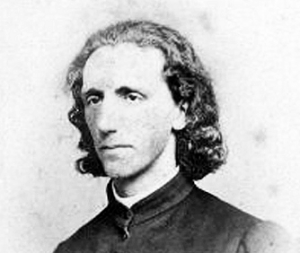 An interesting review by Guillaume Fréchette, of Mark Textor’s new book Brentano’s Mind. Naturally this deals among other things with the claim for which Brentano is most famous; that intentionality is the distinctive feature of the mental (and so of thoughts, consciousness, awareness, and so on). Textor apparently makes five major claims, but I only want to glance at the first one, that in fact ‘Intentionality is an implausible mark of the mental’.
An interesting review by Guillaume Fréchette, of Mark Textor’s new book Brentano’s Mind. Naturally this deals among other things with the claim for which Brentano is most famous; that intentionality is the distinctive feature of the mental (and so of thoughts, consciousness, awareness, and so on). Textor apparently makes five major claims, but I only want to glance at the first one, that in fact ‘Intentionality is an implausible mark of the mental’.
What was Brentano on about, anyway? Intentionality is the property of pointing at, or meaning, or being about, something. It was discussed in medieval philosophy and then made current again by Brentano when he, like others, was trying to establish an empirical science of psychology for the first time. In his view:
“intentional in-existence, the reference to something as an object, is a distinguishing characteristic of all mental phenomena. No physical phenomenon exhibits anything similar.”
Textor apparently thinks that there’s a danger of infinite regress here. He reads Brentano’s mention of in-existence as meaning we need to think of an immanent object ‘existing in’ our mind in order to think of an object ‘out there’; but in that case, doesn’t thinking of the immanent object require a further immanent object, and so on. There seems to be more than one way of escaping this regress, however. Perhaps we don’t need to think of the immanent object, it just has to be there. Maybe awareness of an external object and introspecting an internal one are quite different processes, the latter not requiring an immanent object. Perhaps the immanent object is really a memory, or perhaps the whole business of immanent objects reads more into Brentano than we should.
Textor believes Brentano is pushed towards primitivism – hey, this just is the mark of the mental, full stop – and thinks it’s possible to do better. I think this is nearly right, except it assumes Brentano must be offering a theory, even if it’s only the bankrupt one of primitivism. I think Brentano observes that intentionality is the mark of the mental, and shrugs. The shrug is not a primitivist thesis, it just expresses incomprehension. To say that one does not know x is not to say that x is unknowable. I could of course be wrong, both about Brentano, and particularly about Textor.
What I think you have to do is go back and ask why Brentano thought intentionality was the mark of the mental in the first place. I think it’s a sort-of empirical observation. All thoughts are about, or of, something. If we try to imagine a thought that isn’t about anything, we run into difficulty. Is there a difference between not thinking of anything and not thinking at all (thinking of nothing may be a different matter)? Similarly, can there be awareness which isn’t awareness of anything? One can feel vast possible disputes about this opening up even as we speak, but I should say it is at least pretty plausible that all mental states feature intentionality.
Physical objects, such as stones, are not about anything; though they can be, like books, if we have used the original intentionality of our minds to bestow meaning on them; if in fact we intend them to mean something. Once again, this is disputable, but not, to me, implausible.
Intentionality remains a crucially important aspect of the mind, not least because we have got almost nowhere with understanding it. Philosophically there are of course plenty of contenders; ideas about how to build intentionality out of information, out of evolution, or indeed to show how original intentionality is a bogus idea in the first place. To me, though, it’s telling that we’ve got nowhere with replicating it. Where AI would seem to require some ability to handle meaning – in translation, for example – it has to be avoided and a different route taken. While it remains mysterious, there will always be a rather large hole in our theories of consciousness.
